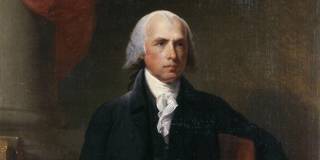Judicial conservatives in the United States frequently cite a caricatured James Madison to justify their "originalist" approach to constitutional interpretation. But the real Madison was a complex thinker who thought his successors should have the power to judge how his words would be interpreted.
CHICAGO – The US Supreme Court’s recent rulings on cases involving guns, abortion, climate change, tribal sovereignty, religion in schools, and individuals’ ability to sue government officials for rights violations have uncorked a torrent of commentary about the ascendance of “originalism” among the six-justice conservative majority. The text of the US Constitution, on this view, means only what its authors intended or what readers at the time it was written would have understood it to mean. “History Triumphs at Supreme Court,” declared one recent headline. “Supreme Court Again Nods to History, Tradition in Religion Case,” asserted another.
As a historian and constitutional law scholar, I am troubled by this framing. It is simply false to suggest that the Court’s conservative majority is doing anything that resembles “history.”
Originalists would have us believe that constitutional interpretation is quite simple. The late justice Antonin Scalia, one of originalism’s most influential exponents, argued that the Constitution “is not living but dead” – and “enduring.” The Constitution “means today not what current society, much less the courts, thinks it ought to mean, but what it meant when it was adopted.”

CHICAGO – The US Supreme Court’s recent rulings on cases involving guns, abortion, climate change, tribal sovereignty, religion in schools, and individuals’ ability to sue government officials for rights violations have uncorked a torrent of commentary about the ascendance of “originalism” among the six-justice conservative majority. The text of the US Constitution, on this view, means only what its authors intended or what readers at the time it was written would have understood it to mean. “History Triumphs at Supreme Court,” declared one recent headline. “Supreme Court Again Nods to History, Tradition in Religion Case,” asserted another.
As a historian and constitutional law scholar, I am troubled by this framing. It is simply false to suggest that the Court’s conservative majority is doing anything that resembles “history.”
Originalists would have us believe that constitutional interpretation is quite simple. The late justice Antonin Scalia, one of originalism’s most influential exponents, argued that the Constitution “is not living but dead” – and “enduring.” The Constitution “means today not what current society, much less the courts, thinks it ought to mean, but what it meant when it was adopted.”